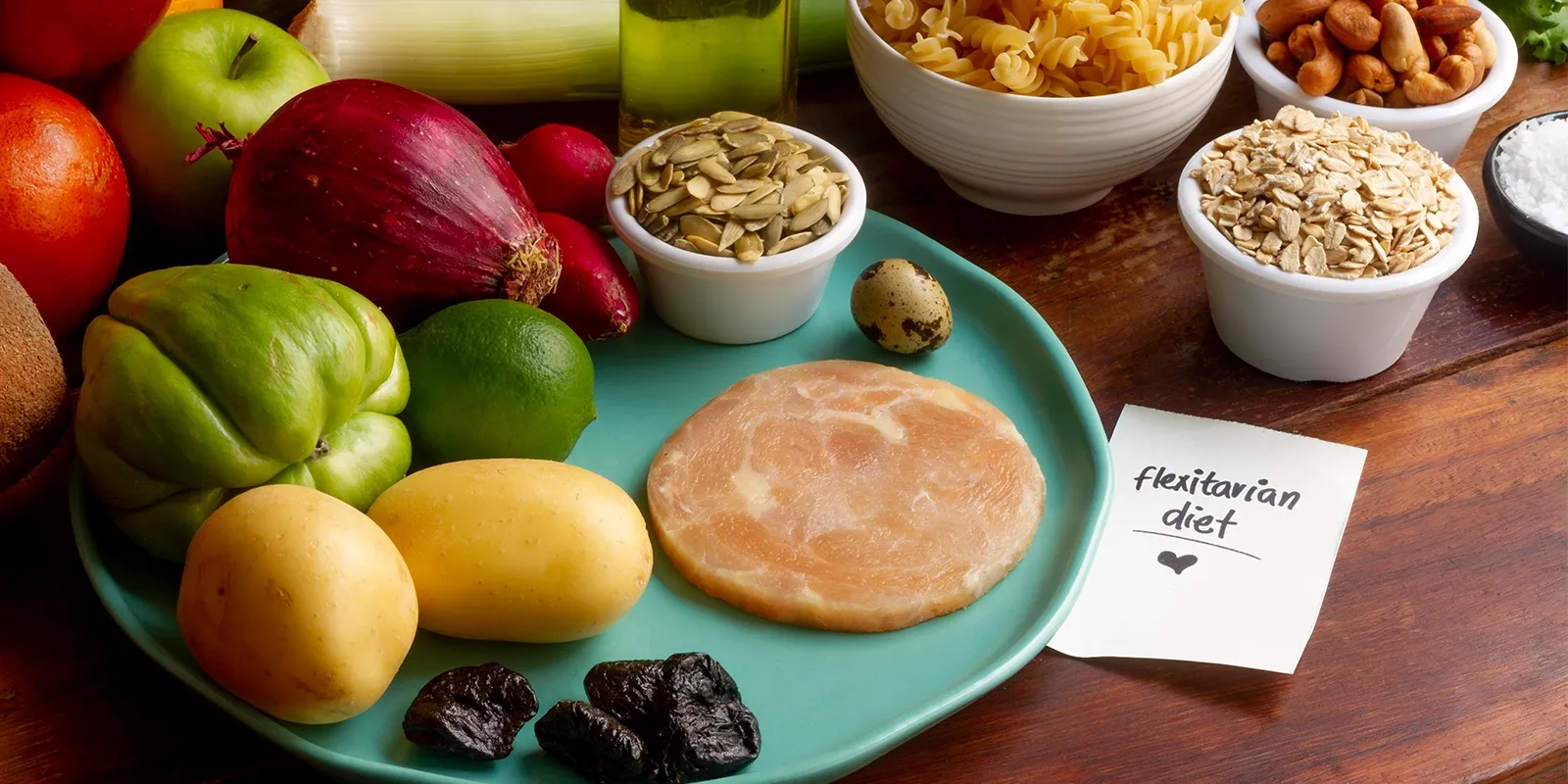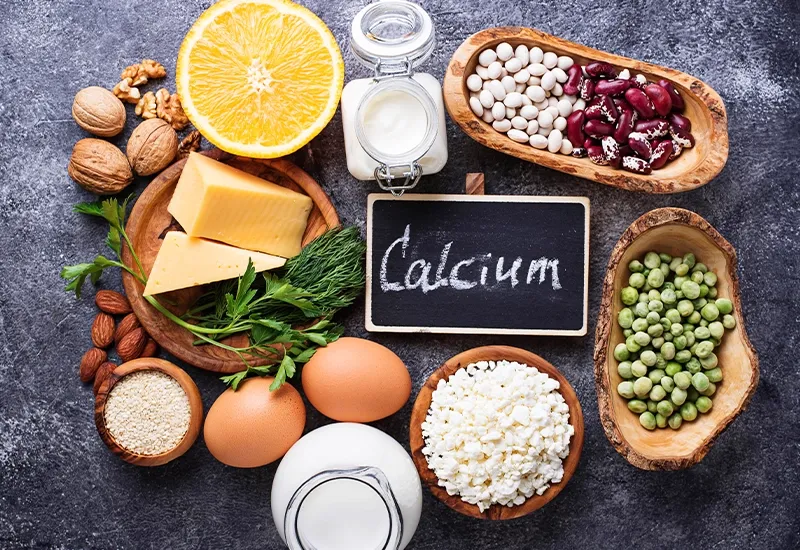
Osteoporosis and Diet: Foods That Help Strengthen Your Bones

Dr. W. Rizvi
14 Oct 2025
Bones form the foundational support system of the human body. They protect internal organs, assist in movement, and store essential minerals that support various physiological functions. However, as the body ages, bone mass naturally declines. This gradual reduction can become dangerous when it crosses a threshold, leading to a disease known as osteoporosis. Osteoporosis gradually destroys bones, making them more fragile and prone to breaking, particularly in key regions such as the hips, spine, and wrists.
While genetics and hormonal changes do play significant roles, diet is the most easily modifiable factor. Focusing on a well-balanced osteoporosis diet filled with bone-strengthening nutrients can help maintain skeletal integrity throughout life.
Why Osteoporosis Happens
Osteoporosis occurs when bone creation fails to keep pace with bone removal. Bone is a living tissue that is constantly being broken down and rebuilt. When we are young, our bodies build new bone tissue more quickly than they lose the old, leading to stronger and denser bones. This process starts to slow in the mid-30s, and by the time menopause occurs (for women), the rate of bone loss accelerates.
Several factors contribute to osteoporosis. Hormonal changes, particularly the decrease in estrogen, play a major role. A sedentary lifestyle or lack of weight-bearing exercise can also weaken bones over time. Nutritional deficiencies, especially a low intake of key nutrients like calcium and vitamin D, add to the risk. Lifestyle choices such as smoking and excessive alcohol use, along with the use of certain medications. Although these risks may sound daunting, most are manageable. Nutrition, in particular, is a daily decision that has a direct impact on bone resilience. A proper osteoporosis diet can delay or even prevent the onset of bone deterioration.
Vital Nutrients for Maintaining Strong Bones
Calcium
Calcium helps build strong bones and muscles and ensures that our nerves function properly. However, it’s not enough to eat calcium-rich foods; the body must also absorb and utilize them effectively. Factors such as age, vitamin D levels, and digestive health impact how efficiently calcium is absorbed.
Good calcium-rich foods include dairy products like milk, yogurt, and cheese, which provide highly absorbable calcium along with protein and phosphorus. Dark leafy greens such as kale, broccoli, and bok choy are excellent non-dairy sources, though some greens like spinach contain oxalates that hinder absorption. Fish with edible bones, such as sardines or salmon, are also rich in calcium and naturally contain vitamin D. Calcium-fortified products, including plant-based milks (soy, almond, or oat) and fortified cereals, are helpful options for those who avoid animal products. Even tofu made with calcium sulfate offers a powerful combination of protein and calcium.
Vitamin D
Vitamin D acts as a gatekeeper, ensuring your body absorbs and manages calcium effectively. Even if your diet is calcium-rich, insufficient vitamin D means much of that calcium goes unused.
You can get vitamin D through sun exposure, where your skin produces it naturally after 10–20 minutes of sunlight a few times per week. Food sources like fatty fish (salmon, mackerel, and tuna) are among the best natural providers, while egg yolks and beef liver add smaller amounts. Fortified foods such as plant-based milks and breakfast cereals also help meet daily needs. For those in low-sunlight areas or with darker skin tones, vitamin D synthesis is lower, making dietary intake especially important.

Magnesium and Phosphorus
Both magnesium and phosphorus are crucial for bone health. Magnesium supports the body’s ability to utilize vitamin D, which is vital for calcium absorption, while phosphorus combines with calcium to form the hard mineral structure of bones. However, too much phosphorus especially from processed foods can upset this balance.
Excellent sources of these nutrients include whole grains like quinoa, oats, and brown rice, which deliver both minerals along with fiber. Legumes such as lentils, black beans, and peas are great for plant-based diets, while nuts and seeds (especially almonds, pumpkin seeds, and sunflower seeds) provide magnesium and healthy fats. Even avocados and bananas, though not primary sources, contribute to an overall nutrient-rich diet that supports strong bones.
Protein
While minerals are vital, bones also depend on a protein framework for structure. Collagen, the main protein in bones, acts as a foundation that minerals attach to. Without enough protein, this foundation weakens, increasing the risk of fractures. Since the body’s ability to process protein declines with age, maintaining adequate intake is key.
Good protein sources include lean meats like chicken, turkey, and beef, which support tissue repair. Fatty fish such as sardines and salmon provide both protein and bone-supporting nutrients like vitamin D and omega-3 fatty acids. Dairy products combine protein with calcium, while legumes chickpeas, lentils, and black beans are affordable and rich in both protein and fiber. For vegetarians or vegans, plant-based proteins like tofu, tempeh, and soy milk are excellent alternatives.
Smart Eating Patterns for Bone Health
Strong bones aren’t built from individual nutrients alone they depend on balanced eating habits. A bone-friendly diet includes a variety of foods that supply the body with essential nutrients while limiting substances that interfere with absorption.
For optimal results, aim to balance protein with calcium in every meal and limit excess sodium and processed foods. Reducing soda and caffeine, and cutting back on alcohol, supports mineral retention. Staying well-hydrated and avoiding smoking, which weakens bones, further enhances long-term bone strength. These consistent habits create a lasting defense against bone loss.
Is a Plant-Based Diet Compatible with Strong Bones
Yes, a plant-based diet can fully support bone strength if it’s carefully planned. Since many nutrients essential for bone health are more abundant in animal-based foods, plant-based eaters must ensure proper substitutions and supplementation.
To maintain bone health, use fortified plant milks and juices for calcium and vitamin D, and incorporate soy-based foods like tofu and tempeh regularly. Eating plenty of leafy greens, nuts, seeds, and legumes every day ensures a wide nutrient intake. Fully vegan individuals should also consider B12 and vitamin D supplements when necessary. A thoughtful vegetarian diet for osteoporosis can meet all nutritional needs for bone protection and maintenance.
Foods That May Harm Your Bones
Certain foods may hinder bone health if consumed excessively. Excess salt promotes calcium loss through urine, while caffeinated drinks in large quantities reduce calcium retention. Cola-type sodas, containing phosphoric acid, may interfere with calcium balance. Highly processed foods often lack essential nutrients and can displace healthier options. Total elimination isn’t required, but moderation and awareness go a long way in maintaining strong bones.

Need Any Help?
Contact UsWhy Lifestyle Choices Matter
Diet is only part of the equation physical activity plays a vital role in maintaining bone density. Exercises that gently stress the bones encourage them to rebuild and strengthen over time.
Engaging in brisk walking, strength training with weights or resistance bands, and gentle exercises like yoga or Pilates helps maintain bone mass. Even low-impact aerobic workouts can contribute significantly to bone health when done regularly.
Conclusion
By focusing on a nutrient-rich osteoporosis diet filled with calcium, vitamin D, magnesium, and protein, people of all ages can protect and strengthen their bones. Including a diverse range of foods for bone health while avoiding harmful dietary patterns supports lifelong skeletal strength.
Small, consistent choices today balanced meals, regular movement, and mindful habits can ensure you walk confidently and independently decades from now. Build your bones as you build your life intentionally and with strength.
Resource:
Share This:
Disclaimer
*Please note that the information provided in the blogs and articles is intended for general informational purposes only and should not be considered medical advice. We strive to bring you the latest information about the endocrine world; however, we encourage you to seek individual medical advice and treatment options during your consultation with a qualified healthcare professional. *
